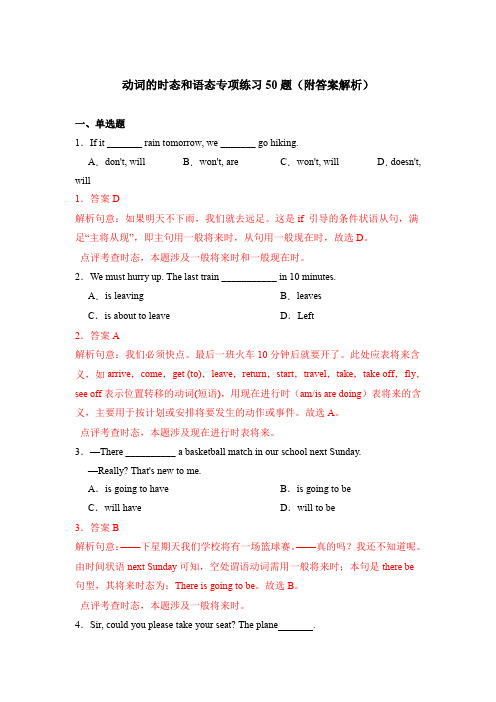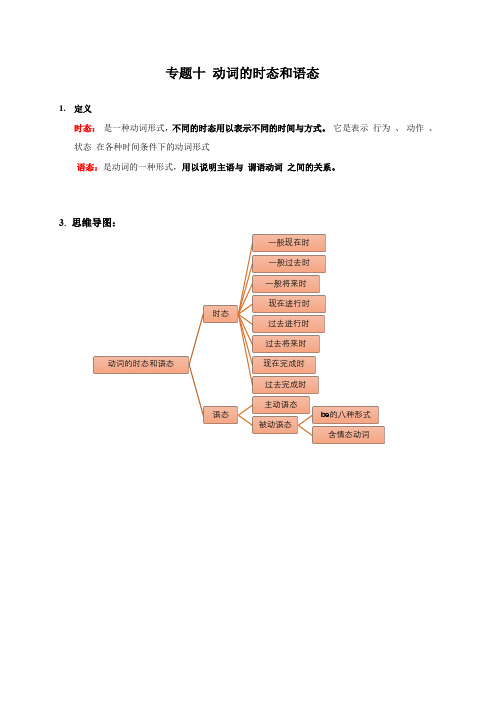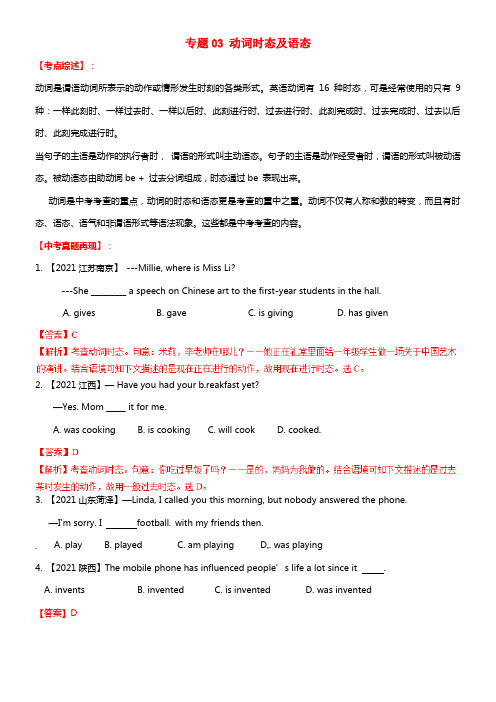动词的时态和语态专题
专题06 动词的时态和语态-2022年高考英语语法易错点快速突破(解析版)

专题06 动词时态和语态一真题感悟1.(2020高考全国卷Ⅰ)The unmanned Chang’e-4 probe -- the name was inspired by an ancient Chinese moon goddess--_____(touch) down last week in the South Pole-Aitken basin.【答案】touched【解析】考查谓语动词的时态。
根据时间状语last week可知,此处是叙述过去发生的动作,应该使用一般过去时,因此应该填入所给动词的过去式。
2.(2021 高考全国乙卷改错)And hopes this this can inspire more thinking on the topic!【答案】hopes改为hope【解析】考查谓语动词的时态和主谓一致。
本句为省略句子主语I,故将hopes改为hope。
3.(2020高考全国卷II) This is why decorating with plans, fruits and flowers _____(carry) special significance.【答案】carries【解析】考查动词时态和主谓一致。
本句讲述春节习俗,应用一般现在时,句子主语为decorating with plants, fruits and flowers。
动名词短语作主语时,谓语动词需用单数形式。
5.(2020高考全国卷III)The artist was sure he would _____(choose), but when he presented his masterpiece to the emperor’s chief minister, the old man laughed.【答案】be chosen【解析】考查被动语态。
句意“这位艺术家特别确信自己能被选上”。
分析句子结构可知,动词choose与主语he之间为逻辑上的动宾关系,且在情态动词后,故填be chosen。
初中英语语法专项8动词的时态和语态

【中考考点】
(1)动词的第三人称单数形式、过去式、过去分词和现在分词的构成。 (2)动词的八种时态的基本结构及用法。 (3)动词的被动语态的基本结构及用法。 (4)动词的主动形式表示被动意义的用法。
动词的时态
考点一 一般现在时
1.结构 一般现在时主要用动词原形表示(当主语是第三人称单数时,谓语动词用第三人称单数形式)。 2.动词的第三人称单数形式变化规则 (1)直接加-s。如:work—works (2)以“辅音字母+y”结尾的词,先变y为i,再加-es。如:carry—carries, cry—cries, try—tries, study—studies (3)以s, x, o, ch, sh结尾的词加-es。如: pass—passes, fix—fixes, go—goes, do—does, teach—teaches, wash—washes (4)特殊:have—has, are—is
动词的时态
考点四 过去将来时
1.结构 would+动词原形 was/were+going to+动词原形 2.用法 表示从过去的某一时刻看,将要发生的动作。 His uncle said that there would be a good harvest the next year.他叔叔说第二年会有一个 好收成。 【注意】 在由if引导的条件状语从句中,如果主句用过去将来时,那么if从句需用一般过去时代替过 去将来时。 If he were here, he would show us how to do it. 如果他在这儿,他就会向我们展示该如何做。
动词的时态
4.动词过去式的变化规则 (1)一般情况下,在动词原形后加-ed。如: watch—watched (2)以不发音的字母e结尾的加-d。如:live—lived (3)以“辅音字母+y”结尾的,变y为i,再加-ed。如: study—studied, carry—carried, cry—cried (4)以重读闭音节结尾,且末尾只有一个辅音字母的,先双写该辅音字母,再加-ed。如: stop—stopped, plan—planned, prefer—preferred (5)不规则动词的过去式需特殊记忆。
初中英语动词的时态和语态专项练习50题(附答案解析)

动词的时态和语态专项练习50题(附答案解析)一、单选题1.If it _______ rain tomorrow, we _______ go hiking.A.don't, will B.won't, are C.won't, will D.doesn't, will1.答案D解析句意:如果明天不下雨,我们就去远足。
这是if 引导的条件状语从句,满足“主将从现”,即主句用一般将来时,从句用一般现在时,故选D。
点评考查时态,本题涉及一般将来时和一般现在时。
2.We must hurry up. The last train ___________ in 10 minutes.A.is leaving B.leavesC.is about to leave D.Left2.答案A解析句意:我们必须快点。
最后一班火车10分钟后就要开了。
此处应表将来含义,如arrive,come,get (to),leave,return,start,travel,take,take off,fly,see off表示位置转移的动词(),用现在进行时(am/is are doing)表将来的含义,主要用于按计划或安排将要发生的动作或事件。
故选A。
点评考查时态,本题涉及现在进行时表将来。
3.—There __________ a basketball match in our school next Sunday.—Really? That's new to me.A.is going to have B.is going to beC.will have D.will to be3.答案B解析句意:——下星期天我们学校将有一场篮球赛。
——真的吗?我还不知道呢。
由时间状语next Sunday可知,空处谓语动词需用一般将来时;本句是there be句型,其将来时态为:There is going to be。
初中英语人教版 中考 语法专题 10 动词的时态和语态

专题十动词的时态和语态1.定义时态:是一种动词形式,不同的时态用以表示不同的时间与方式。
它是表示行为、动作、状态在各种时间条件下的动词形式语态:是动词的一种形式,用以说明主语与谓语动词之间的关系。
3. 思维导图:动词的时态和语态时态一般现在时一般过去时一般将来时现在进行时过去进行时过去将来时现在完成时过去完成时语态主动语态被动语态be 的八种形式含情态动词1.动词的时态1.常考的时态构成及用法a.一般现在时d.现在进行时e.过去进行时f.过去将来时g.现在完成时h.过去完成时2. 动词的语态a. 分类:主动语态:表示主语是动作的执行者被动语态:表示并语是动作的执行者c.主动语态和被动语态的转换规则典型例题总分:50分姓名:得分:1.单选题(每小题1分,共50分)( ) 1. Jenny, together with the Greens the White Tower Park if it tomorrow.A.are going to; isn't rainyB.is going to; doesn't rainC.are going to; won't rainD.is going to; isn't rain( ) 2. The old man for quite some time.A.has diedB.dieC.has deadD.has been dead( ) 3. It is reported that a tall building in the city next year.A.will be builtB.were buildC.have builtD.will build( ) 4. My sister for 2 years.A.has marriedB.have got marriedC.has been marriedD.married( ) 5. Chinese ________in many schools around the world and many people love to learn it.A.teachesB.is teachingC.has taughtD.is taught( ) 6. When Tom was in primary school, he ________the piano every day.A.playsB.playedC.was playingD.has played( ) 7. A baby's first month birthday is a special event in China and _____with a special Party.A.celebratesB.is celebratedC.was celebratedD.will celebrate( ) 8. -Were you at home at 9 o'clock last night?-Yes, I a shower at that time.A.tookB.was takingC.was takenD.am taking( ) 9. National Day celebrations for China's seventieth birthday in about three months.A.will be heldB.will holdC.is heldD.was held( ) 10. We don't know if he tomorrow. If he, I will call youA.will come, will comeB.will come, comeses, will comees, comes( ) 11. He told me that he ______ his uncle in Thailand the next day.A.will visitB.has visitedC.is going to visitD.would visit( ) 12. -Tom, do you know ________? -In Beijing.A.where will the 24th Winter Olympics be heldB.where the 24th Winter Olympics will holdC.where the 24th Winter Olympics will be heldD.where will the 24th Winter Olympics hold( ) 13. Peter with his classmates ________ for the bus when the earthquake happened.A.is waitingB.was waitingC.are waitingD.were waiting( ) 14. his museum ________ here for over 80 years. It ________ one of the oldest buildings in this city.A.is; wasB.had been; isC.was; has beenD.has been; is( ) 15. -Mrs. Brown, how long can books from the school library ?-At most two weeks.A.borrowB.keepC.be borrowedD.be kept( ) 16.-An AI robot _____in our school dining hall next term.-I'm looking forward to it.A.will useB.will be usedC.is usedD.was used( ) 17. Usually a baby's face ____ smooth.A.is feelingB.feltC.feels likeD.feels( ) 18. She _____ an English magazine when I came in.A.readsB.has readC.will readD.was reading( ) 19. I will call you as soon as he______ here.A.arriveB.will arriveC.arrivesD.arrived( ) 20. Boys and girl, ______ learning and have fun!A.keepB.to keepC.keepingD.kept( ) 21. There ______a basketball game between these two grades in the gym this afternoon.A.willB.is going to haveC.is going to beD.will have( ) 22. We ______TV from seven to nine last night.A.were watchingB.will watchC.watchedD.watch( ) 23. Jack's mother taught me how ________ Yunnan rice noodles last weekend.A.to makeB.makingC.makeD.to making( ) 24. Mrs. Green said the plates ________ right away,or they would become difficult to wash.A.will be washedB.should washC.will washD.should be washed( ) 25. The documentary Under the Dome (《苍穹之下》)which ________ by Chai Jing showed us that the air pollution in China was very serious.A.producesB.producedC.is producedD.was produced( ) 26. -What did you do last night?- I ________ my homework and watched TV.A.didB.doC.am doingD.will do( ) 27.The hospital is very famous. It _______ in 2001.A.buildsB.builtC.was builtD.is built( ) 28.These rules are made the disabled.A.protectB.protectedC.to protectD.protecting( ) 29. -How much does the TV ?-Not too much. It's just a second-handed one.A.costB.spendC.takeD.pay for( ) 30. -Have you ever ________ an amusement park?- Yes, I have ________ Fun Times Amusement Park last year.A.been to, have gone toB.gone to, have been toC.go to, went toD.been to, went to( ) 31.We are glad to hear that the terrorists ________ by the brave policemen several days ago.A.are caughtB.were caughtC.have been caughtD.are going to be caught ( ) 32. -Why didn't you go to the party last night? - Because I _____.A.wasn't invitedB.didn't invitedC.haven't invitedD.don't invited ( ) 33. -What _____ you supposed ____ when you are in China?- You should shake hands.A.are, to doB.do, to doC.are, doingD.have, to do( ) 34. So far, we ________ English for three years.A.have learntB.learnC.learntD.had learnt( ) 35.The boy was made ______ the words again and again.A.copyB.copyingC.copiesD.to copy( ) 36. The sports meeting in our school now.A.being heldB.is havingC.is holdingD.is being held( ) 37. The window ____ ten minutes ago, and the room is bright now.A.can be cleanedB.is cleanedC.was cleanedD.will be cleaned( ) 38. -Oh, Mrs. King, your necklace looks nice. Is it new?-No, I _______ it for 2 years.A.hadB.have hadC.boughtD.have bought( ) 39. He has ordered a watch on line for his father and it _______ to him before Father's Day.A.sendB.will be sentC.was sentD.sent( ) 40. There ______ a funny cartoon on CCTV 6 this evening.A.willB.will haveC.is going to beD.is going to have( ) 41. -________ did your uncle leave his home town? -He ___________ for nearly twenty years.A.When, has leftB.When, has been awayC.How long, has leftD.How long, has been away ( ) 42. My uncle ________ Germany on business many times.A.has been onB.has gone toC.has been toD.has been in( ) 43. Her life ________ a lot during the last three years.A.changedB.changingC.has changedD.will change( ) 44. -Lisa was seen ______ an old man go across the street this morning. -What a kind girl she is!A.helpingB.helpedC.to helpD.helps( ) 45. My computer has broken down. I'll get it _______ this afternoon.A.repairsB.repairedC.to repairD.repairing。
中考英语备考 专题03 动词时态及语态(含解析)

专题03 动词时态及语态【考点综述】:动词是谓语动词所表示的动作或情形发生时刻的各类形式。
英语动词有16种时态,可是经常使用的只有9种:一样此刻时、一样过去时、一样以后时、此刻进行时、过去进行时、此刻完成时、过去完成时、过去以后时、此刻完成进行时。
当句子的主语是动作的执行者时,谓语的形式叫主动语态。
句子的主语是动作经受者时,谓语的形式叫被动语态。
被动语态由助动词be + 过去分词组成,时态通过be 表现出来。
动词是中考考查的重点,动词的时态和语态更是考查的重中之重。
动词不仅有人称和数的转变,而且有时态、语态、语气和非谓语形式等语法现象。
这些都是中考考查的内容。
【中考真题再现】:1. 【2021江苏南京】---Millie, where is Miss Li?---She _________ a speech on Chinese art to the first-year students in the hall.A. givesB. gaveC. is givingD. has given2. 【2021江西】— Have you had your b reakfast yet?—Yes. Mom _____ it for me.A. was cookingB. is cookingC. will cookD. cooked3. 【2021山东菏泽】—Linda, I called you this morning, but nobody answered the phone.—I'm sorry. I football with my friends then.A. playB. playedC. am playingD. was playing4. 【2021陕西】The mobile phone has influenced people’s life a lot since it .A. inventsB. inventedC. is inventedD. was invented【答案】D【解析】考查动词时态及语态。
动词的时态和语态

【翻译句子】 (7) He told me he read an interesting novel last night. 他告诉我他昨晚看了一本有趣的小说。 【结论2】如果从句中有一个过去的时间状语,尽 管从句中的动作先于主句发生,但从句中的谓语动 词仍用过去式。 【结论3】表示两个紧接着发生的动作,常由以下 词语连接,用一般过去时。常见连词有:but, and, when, as soon as, immediately, the moment, the minute。 如 : He rushed into the room and sat down immediately.
【疑难2】 We had no sooner been seated than the bus started. = No sooner had we been seated than the bus started. 【疑难剖析2】hardly / scarcely…when (before);no sooner…than表示“一……就……”。
3. 一般将来时 【翻译句子】 (8)我们下周将会讨论这个话题。 We will talk about this topic next week. 【结论1】表示未来的动作或状态常用will / shall + 动词(常与表示将来的时间状语连用,如tomorrow, next week等)。
【翻译句子】 (9) The bus is coming. 公共汽车就要到了。 【结论2】表示一种趋向或习惯动作。表示趋向行 为的动词,如come,go,start,begin,leave等词, 常用进行时的形式表示将来时。
【疑难2】The room remains clean. You are allowed to speak here. 【疑难剖析2】下面四类动词不宜用现在进行时: a. 表示心理状态、情感的动词:like, love, hate, care, remember, believe, want, mind, wish, agree, mean, need。 b. 表存在的状态的动词:appear, exist, lie, remain, seem, belong to, depend on。 c. 表示瞬间动作的动词:allow, accept, permit, promise, admit, complete。 d. 表示感官的动词:see, hear, notice, feel, smell, sound, taste, look。
(人教版)中考英语总复习语法:专题8-动词的时态、语态(101页)

(2)过去完成时与现在完成时的主要区别是时间参 照点不同: 过去完成时的时间参照点是某个“过去的” 时间;现在完成时的时间参照点是“现在”。因此现在 完成时中的很多规则,也适用于过去完成时。 When I got to the cinema, the film had been on. 当我到达电影院时,电影已经开始了。
以辅音字母+y结尾的动词, 把y变为i再加-ed
以一个元音字母加一个辅音 字母结尾的重读闭音节词, 双写结尾字母再加-ed
study→studied carry→carried stop→stopped drop→dropped prefer→preferred
3.一般将来时 (1)表示将来某个时间要发生的动作或存在的状 态,其构成形式:“will/shall+动词原形”。常与表 示将来的时间状语tomorrow,next week,in+一段时 间等连用。 当主语是第一人称I或we时,问句中一般用shall。
③表单纯性的将来,与人的主观愿望和判断无关 时。 If it's made of wood, it will float on water. 这要是木材做的,它能浮在水面上。 (4)当主句为一般将来时态时,在if,as soon as, until, when等引导的状语从句中用一般现在时代替一 般将来时。 I will call you as soon as I get there. 我一到那儿就给你打电话。
特殊情况:have→has,am/are→is 考查热点:如果主句为一般将来时,if,unless等 引导的条件状语从句和when,until,as soon as等引导 的时间状语从句常用一般现在时表示将来。 What about going climbing if it doesn't rain tomorrow? 如果明天不下雨,去爬山怎么样?
专题10 动词的时态和语态(课件)-2024年中考英语复习(全国通用)

14.(2022·湖北武汉·统考中考真题)—I don’t think sixteen-year-olds should be allowed
to drive. —I ________. It’s not safe. A.agree B.agreed C.will agree
D.had agreed
apples in the fridge now.
A.is
B.are
C.was
D.were
【答案】A 【解析】句意:现在冰箱里有一些果汁和几个苹果。考查一般现在时及 “there be”。根据“now”,排除过去时态的CD,由于there be的就近原则, some juice不可数,所以应是is。故选A。
5.(2023·甘肃白银·校考一模)Thanks to those cleaners who ________ hard on the streets, we can have a beautiful city. A.work B.worked C.have worked D.were working
真理。
时态的辨析 满分秘籍
易失分点
提分特训
时态 谓语动词
意义
例句
一般
表示过去
过去 was/were,did 的动作或
时
状态。
When he was a child, he often swam in the river.当他小的时候,他经常在河里游泳。
16.(2023·江苏南通·统考一模)—What will the weather be like tomorrow? —I was on the phone and ________ most of the weather report. A.have missed B.was missing C.will miss D.missed
- 1、下载文档前请自行甄别文档内容的完整性,平台不提供额外的编辑、内容补充、找答案等附加服务。
- 2、"仅部分预览"的文档,不可在线预览部分如存在完整性等问题,可反馈申请退款(可完整预览的文档不适用该条件!)。
- 3、如文档侵犯您的权益,请联系客服反馈,我们会尽快为您处理(人工客服工作时间:9:00-18:30)。
1、When I was in the factory, I 表示过去一段时间内经常或 often worked in the workshop. 反复发生的行为,常与 2、He usually came to school by every day\often\sometimes等 bike last year. 时间状语连用,“used to+动 3、We used to get up at five 词原形”或“would+动词原 every morning when we were at
(be和have例 外)
进行时态
am Is 现在 Are 分词 Have 过 去 Has 分 词 Have +been+ Has 现在 分词
Was 现在 Shall Should be+现 Were 分词 be+现在 Would 在分词 Will 分 词 Had+过去 分词 Had+ been+现在 分词 Shall +have+ Will 过去 分词 Shall have+ Will been+ 现在分 词 Should +have Would 过去分词 Should have+ Would been+ 现在分词
三.各种时态的用法
1、The students often do their
experiment in the laboratory. 表示现在习惯或反复发生 2、We always care for each other 的动作或存在的状态,常 and help each other. 与usually、always、 3、I am used to listening to the Seldom、sometimes、 weather report every morning. often、frequently、every 4、He sometimes stays up till day、every week、(year midnight to catch up with morning)on Sunday等时间 others. 状语连用。 5、Do you usually go to school on Sunday. 表示主语现在的特征、性 格和状态 1、She is always ready to help others. 2、China is a developing country which belongs to the third world. 3、---Do you sing? –A little. 1、All the living things on the earth depend on the sun. 2、Knowledge comes only from practice. 3、Unpleasant advice ,like bitter medicine ,has welcome effect. *Our teacher told us the earth goes round the sun. 1、I’ll call on you unless it rains the day after tomorrow. 2、Even if it rains tomorrow, the sports meet will take place. 3、We will start as soon as you are ready. 4、However much advice you give him, he will do exactly what he wants.
祈使句 and + +主语+will … 短语 or
fit the new clothes on you.(if条件句 中的will表意 愿)。 5、No ones is to leave the cinema without the police’s permission. 6、We are to finish the work before five this afternoon. 7、I was about to go out when he called on me. 8、They are leaving Nanjing for Guangzhou on Sunday. 9、We are moving to a new house this year. 10、--You’ve left the light on. --Oh, so I have. I‘ll go and turn it off. 11、Leave it with me and I’ll see what I can do. 12、Work hard and you’ll succeed. 13、Work hard or you will fail. If you make another move,. 14 =Make another
表示将来发生的动作或存在的状态,常与 1、No one knows soon/tomorrow/next week/等表示将来的时间 what will happen in 状语连用 the future. 2.We shall know more and more as time goes on. 一 般 将 来 时 Shall +动词原形 1、He will be thirty Will yeas old next years. (1)(单纯)表示将来(2)不用于条件句 2、If she sees him, (3)表(必然的)将来(4)表意愿、决心 she will give him your message. 3、Look at the be going to +动词原形(1)计划、打算 clouds,-- there is 与。。。(2)(客观迹象)预示(3)条件 going to be a 从句表示将来,主句不用“be going to”但条 storm. 件句表现在时,主句可用“be going to “.但条 4、If I meet him 件句本身不限。 tomorrow, I will give him your be on the point of doing sth message. (不用 be about to +动词原形 be going to) 即将或正要去做…不与时间状语连用,但 If I have enough 可和when 从句连用。 money now, I be to +动词原形,表示①预订要做…②(表 will/I am going to 命令、禁止)应该… travel around the world. be+ doing 表示按计划安排即将发生的动 If you are going to 作,常用于go\start\set do it, you had out\leave\reach\arrive\return\come\move\take better do it well. off等位移动词。 If you will take off your clothes ,we’ll
1、The great wall came into being in 221B.C 2、She suddenly fell ill in the classroom the other day. 3、Mr. Jackson came to china a score of years ago. 4、A thief broke into his house and stole his treasure last night.
动词的时态和语态专题
知识网络结构图
现在时 过去时 be going to 一般 be to 将来时 be about to 表示“移动”的动词用现在时和进行时来表示将来 动词常见的 八种时态 进行时 现在 完成时 完成进行时 进行时 过去 完成时 将来时 将来完成时 主动语态 动词的语态 被动语态 主动形式表被动意义 被动形式表主动意义
完成时态 完成进行 时态
二、一般体、进行体、完成体的含义
一般体指某种动作既不正在进行又不确定完成与否的一种广泛意义 上的方式。进行体指一种持续的、未完成的动作。动词的进行时还伴 有其他一些意义,如:有限度的延续性、感情色彩、同时性、描述的 生动性、强调性等。完成体则表示动作发生在某个时间以前,但动作 发生的时间总是未经明确指出的。 (1)The teacher writes his own notes. (现在习惯性动作) (2)The teacher is writing his notes now.(暂且的还在进行的动作) (3)The teacher has already written his notes. 完成的动作) (1)Xiao Wang comes late often.(现在经常性的动作) (2)Xiao Wang is always coming late.(带有不满的色彩) (1) I read a book yesterday evening.(在过去时间的动作) (2)I was reading a book yesterday evening.(过去时间未完成的持续动 作) (3)I have read the book.(现在已经读完那本书了) She is always finding fault with others.(他总是挑别人的毛病) He is constantly leaving things about .(他总是丢三落四) I am hoping you can come and have supper with us. 我正希望您能来和 我们一起吃晚饭。 She has been saying that twenty times. 这话她已经说了20遍。
动 词 的 时 态 和 语 态
一、动词的时态 时态是一种动词形式,它是“时 ”和“体”的组 合,“时 ”有现在、过去、将来、过去将来之 分;“体”有一般、进行、完成进行之别。动词的 动作可发生于四种不同的时间,表示四种不同 的“体”,每一种“时+体”就构成一种时态。所以英 语动词共有16(4×4)种时态,高中英语教学大
